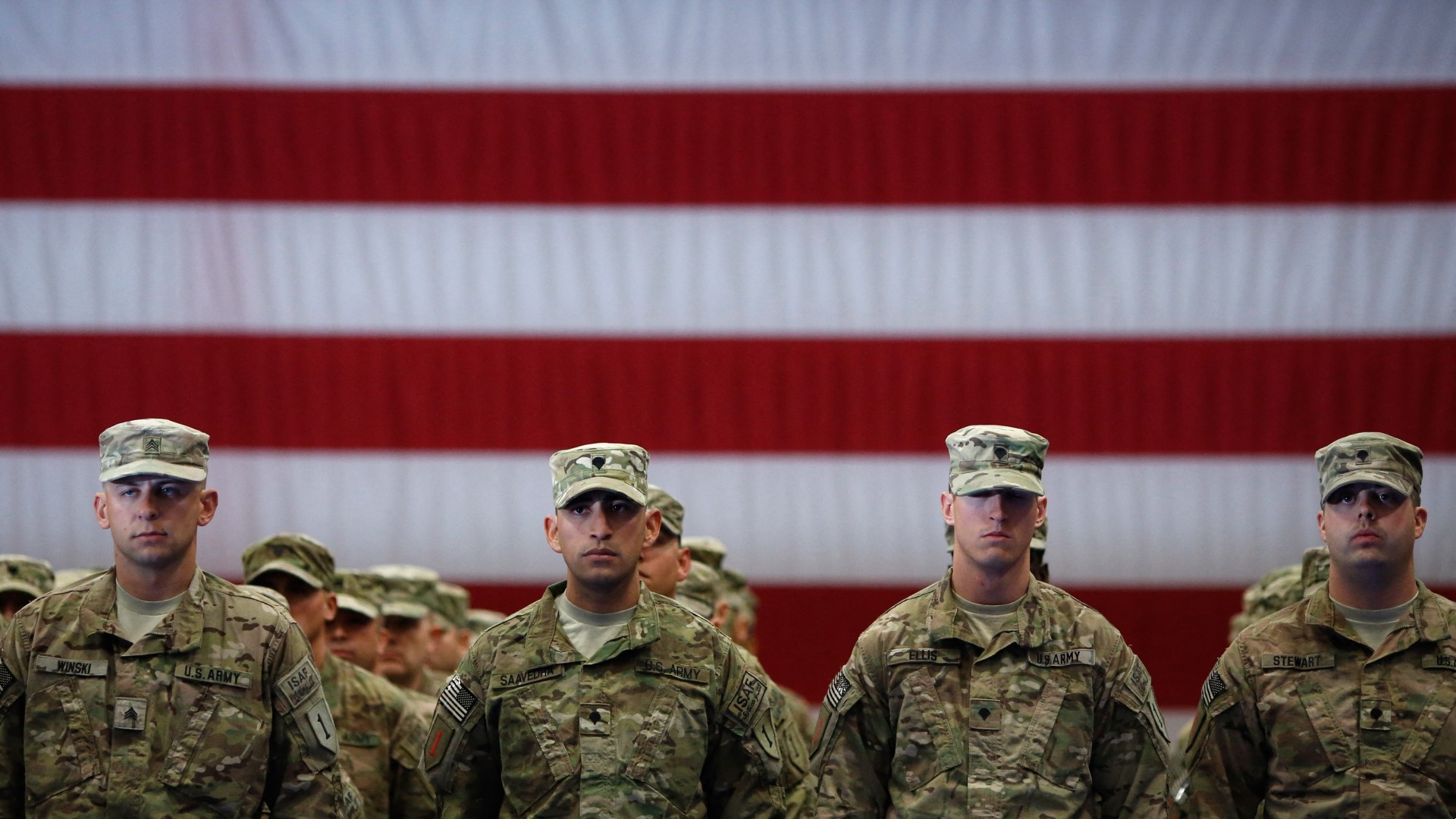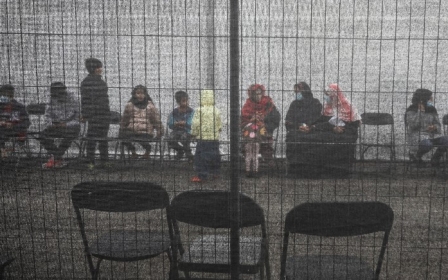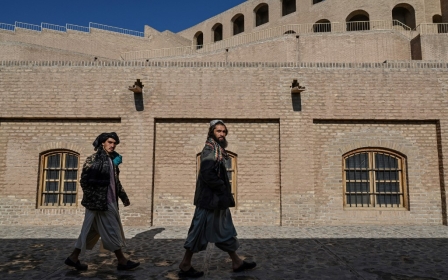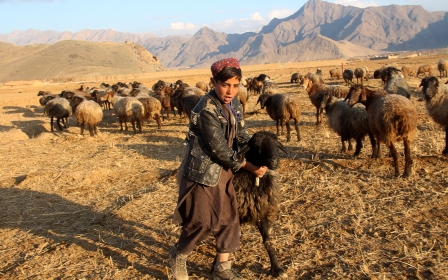Afghan Americans enraged over US marine's 'abduction' of orphan

Afghan American activists have expressed outrage over allegations that a US marine abducted an Afghan war orphan after luring the baby's legal guardians to the US with the promise of providing medical treatment.
The girl, now three years old, lost her parents and five siblings in a classified US-led military operation on 6 September 2019. She was seven months old at the time.
The child's extended family is suing the US marine and his wife in a federal court, alleging that the girl was forcibly taken once she arrived in the US in September 2021.
The complaint, filed on 2 September at the Virginia District Court, states that US Marine Joshua Mast and his wife Stephanie Mast convinced the child's legal guardians to bring her to the US where they would assist with her injuries - a fractured skull and femur and second-degree burns - sustained during the operation.
Court documents say that as soon as her legal guardians arrived in the US, they met with a social worker who took the child from them.
New MEE newsletter: Jerusalem Dispatch
Sign up to get the latest insights and analysis on Israel-Palestine, alongside Turkey Unpacked and other MEE newsletters
"We call on the State Department, the Department of Justice, and the US Marine Corps to immediately investigate the methods that Joshua Mast used to kidnap this child and to intervene in the ongoing court case to bring forth justice and reunite her with her family," Halema Wali, the co-founder of Afghans for a Better Tomorrow, told Middle East Eye.
"Afghans do not need white saviours who disguise human trafficking as humanitarianism in the name of Christianity," Wali said.
The Masts reject the idea that they deceived the family and took the baby from them, saying in a response to the lawsuit that the Mast's informed them of "Mast’s relationship and legal responsibility for the child," Richard Mast wrote in a motion to dismiss the lawsuit.
"The sole legal identity created for Baby Doe saved not only her from the evils of life under the Taliban – it saved numerous others – including Plaintiffs John and Jane Doe. The fact that the Does are here in America today is a result of the countless hours invested by these Americans at no charge to the Does," Richard Mast wrote in a motion to dismiss the lawsuit, he said.
On Sunday, the Ministry of Foreign Affairs of the Islamic Emirate of Afghanistan released a statement in which it called the case worrying, adding it was "far from human dignity and an inhumane act".
The lawyer representing the Afghan family declined to comment about the case and the identity of the plaintiffs, citing safety as the reason for maintaining anonymity.
According to the filing, Joshua Mast, working through his attorney and brother Richard Mast, had already obtained a custody order for the baby despite the child having Afghan citizenship as well as legal guardians in her home country.
Mast's lawyers did not respond to MEE's requests for comment.
Multiple co-conspirators
The complainants also name Richard Mast, the family attorney; and Kimberley Motley, a well-known American lawyer who has been operating in Afghanistan for more than a decade; as well as Ahmad Osmani, a Baptist pastor who acted as a translator between the families; as co-conspirators in the lawsuit.
Richard Mast did not reply to MEE's request for comment but in his motion to have the case dismissed, he described his brother's decision to adopt the child as "selfless", adding that the child had been saved from "the evils of life under the Taliban”.
It is further alleged that Joshua Mast hired Motley to search for and communicate with the legal guardians.
Motley is said to have known that the Masts had obtained a custody order and their purpose was not to offer medical treatment but to secure custody of the baby. “In coordination with Joshua and Stephanie Mast, however, Motley did not disclose the Masts’ true intentions to the Does [name given to the complainants],” the complaint read.
Motley did not reply to MEE's request for comment.
According to the lawsuit, the Masts tried several avenues to have the child transferred into their care when they found out that a next of kin had been located.
On 26 February 2020, the Masts filed a petition against the US government, seeking a temporary restraining order to keep the child in the custody of the American military hospital in Afghanistan where she was staying for treatment. The petitioners in the case remained anonymous, but it was Richard Mast who was the representing attorney.
When this failed, the Masts then took another path - convincing the family to travel to the US to get better medical treatment for the child.
After a year of wrangling with the family, first through Motley and then through the translator Osmani, the Afghan family agreed to bring the little girl to the US in August 2021.
Battle over custody
Concurrent with the discussion between the Mast's representatives and the child's legal guardians in Afghanistan, the Masts were simultaneously working on gaining custody of the child in American courts.
They filed a petition in a Juvenile and Domestic Relations Court in Virginia where they asserted that the former Afghan government, under deposed President Ashraf Ghani, had intended to issue a waiver "in a matter of days" to waive jurisdiction of the child.
But in an email to the Associated Press (AP), which conducted an investigation into the case, Ghani's former deputy chief of staff, Suhrob Ahmed, said there is "no record of this alleged statement of waiver of Afghan jurisdiction".
Unlike in the US, and similar to other Muslim-majority nations, Afghan law dictates that Muslim orphans cannot be given to the custody of non-Muslims and that the child's family lineage cannot be erased.
Under the country's kafala laws, or guardianship system, Muslims are allowed to take in Muslim orphans and raise them alongside their family, but these adopted children are to keep their family names.
The State Department has only recognised 14 American adoptions from Afghanistan in the past decade, none of them in the past two years, according to the AP.
The Virginia court granted a custody order to the Masts in November 2019, on the basis that the child "remains up to this point in time an orphaned, undocumented, stateless minor".
The order was granted despite Virginia law stipulating that the adoption needed to be "finalised pursuant to the laws of the country from which the child was adopted".
But the battle to take custody of the child did not stop there, and the child’s family in Afghanistan accuse the Masts of taking part in a years-long deception to steal their child from them.
Obscure details
Not much is known about the military operation on 6 September 2019 that killed the girl's parents and siblings.
According to the filing, which does not reveal the plaintiffs nor the child's name due to the sensitivity of the case, the Afghan family was killed during a joint operation between US military and Afghan forces in a rural part of the country.
According to legal papers filed by the Masts, the US government "sent helicopters full of special operators to capture or kill" a foreign fighter.
According to the filing, the child’s father detonated a suicide vest while the mother was shot dead by armed forces as they entered the home. Five out of the six children were also killed and their home was completely destroyed.
"US military forces discovered Baby Doe [synonym given to the baby] in the rubble and immediately transported her to a nearby US military hospital for urgent surgical and medical care," the filing reads.
The Department of Defence did not reply to MEE's request for further details of the operation.
Court documents show the US military informed the International Committee of the Red Cross (ICRC) that the child's family was killed and that the ICRC began searching for next of kin.
On 25 October 2019, the ICRC made contact with the child's uncle, and the paternal uncle requested to be reunited with the child. In January 2020, Donna Welton, the US State Department's assistant chief of mission in Kabul, wrote to the Afghan government, noting that the US government was ready to transfer custody of the infant to family members. This was arranged for 26 February 2020, the same day the Masts filed their petition to stop the transfer.
Lucien Christen, ICRC spokesperson based in Kabul, confirmed to MEE they had helped facilitate the reunification of the child with family members. However, Christen said that she was unable to comment on "any legal or administrative procedures that might have followed this reunification, neither is part of any legal process in Afghanistan or abroad".
"The reunification of the baby with the family members in Afghanistan in 2020 is ICRC’s sole implication in the case you are mentioning," Christen added.
Acting Secretary Welton, now in the bureau of political-military affairs, as well as the US State Department, did not reply to several requests from MEE for comment.
The ICRC declined to comment on the specifics of the incident. A spokesperson at the United Nations Mission in Afghanistan told MEE that he was unable to assist with details because "we don't have any ground incident on our records for the mentioned date".
'Tragic'
James Dwyer, a professor of law at William and Mary College in Virginia, told MEE that there was so much "uncertainty about certain important facts [that] it is difficult to predict the ultimate outcome."
"The Virginia court that conferred legal custody and adoption seems to have acted improperly, so the Afghan couple, who now has quite capable American attorneys helping them, should be able to get those actions overturned IF they are deemed to have standing to challenge them."
"The US is in a difficult position diplomatically. It does not want to appear to condone 'baby stealing' by its military, but it also does not want to be blamed if the girl returns to Afghanistan and suffers some tragedy because of the turmoil and human rights situation there," he said.
"The complexity of the case could cause it to drag on for quite a long time, and at some point, stability for the child can - or at least should - become a decisive consideration."
According to the United Nations, 1,659 people were killed and 3,524 were injured in Afghanistan in the first half of 2021, with the total number of civilians killed and injured having "increased by 47 percent" compared with the first half of 2020.
During that same period, the number of civilians killed by air strikes from pro-government forces also increased by 33 percent.
Stephanie Savell, a senior researcher at the Watson Institute for International and Public Affairs at Brown University, described the case as "tragic".
"The costs of the US invasion for people in Afghanistan have been enormous and tragic. By every measure I know of, Afghans are worse off now than they were before the US invasion," Stephanie Savell, a senior researcher at the Watson Institute for International and Public Affairs at Brown University, told MEE.
Savell said that a staggering 97 percent of Afghans are projected to be living in poverty in 2022.
"Large numbers of Afghans are dying and will continue to die because of disease, malnutrition, and a nonfunctioning healthcare system, all of which have been severely exacerbated by the US-led war," Savell said.
In 2020 alone, the ICRC facilitated four family reunifications in Afghanistan and 1049 worldwide.
This includes working to reunite unaccompanied minors with their families where appropriate or identifying other long-term solutions in the best interest of each child.
Middle East Eye delivers independent and unrivalled coverage and analysis of the Middle East, North Africa and beyond. To learn more about republishing this content and the associated fees, please fill out this form. More about MEE can be found here.




